OCZ’s Vertex Limited Edition Review & SSD State of the Union
by Anand Lal Shimpi on February 19, 2010 12:00 AM EST- Posted in
- Storage
Back in December I previewed OCZ’s Vertex 2 Pro, the first drive I’d tested to use SandForce’s SF-1500 controller. As you may remember, the controller works in a radical way - by reducing the amount of data written to flash it improves performance and longevity, at the cost of controller/firmware complexity. Not a bad tradeoff for a company trying to sell you expensive SSD controllers. If you want to know more about how it works, I'd suggest consulting my Vertex 2 Pro Preview. If you want to know how SSDs work, take a look at the SSD Relapse.
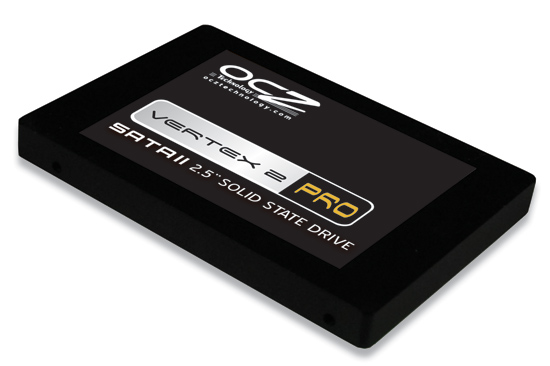
RIP...
The drive made an impressive showing, easily besting any other MLC SSD I’d ever tested. Unfortunately, it was pre-release hardware, with no known price and no set release date. Not to mention that the company who made the controller was shipping largely unproven technology with an unknown amount of reliability/validation testing.
Since then two things have happened.
First, my SandForce SF-1500 pre-release sample straight up died on me. No warning, no errors, just no data. It only took a couple of weeks worth of real world use to make it happen, but this is why I prefaced the preview with the following:
“Ultimately, the task of putting these drives to the test falls on the heads of you all - the early adopters. It’s only after we collectively put these drives through hundreds and thousands of hours of real world usage that we can determine whether or not they’re sponge-worthy. Even Intel managed to screw up two firmware releases and they do more in-house validation than any company I’ve ever worked with. The bugs of course never appeared in my testing, but only in the field in the hands of paying customers. I hate that it has to be this way, but we live in the wild west of solid state storage. It’ll be a while before you can embrace any new product with confidence.
And it only gets more complicated from here on out. The old JMicron drives were easy to cast aside. They behaved like jerks when you tried to use them. Now the true difference between SSDs rears its head after months or years of use.”
And second, the OCZ Vertex 2 Pro as a product has been canned. Not because of the issue that lead to the untimely death of my drive, but because the SF-1500 controller is just too expensive. I knew that it was going to be pricey at the time I wrote the article, but apparently OCZ thought it could bring the price down by the time it shipped. Needless to say, that didn’t happen.
Instead of the Vertex 2 Pro, OCZ will be shipping the regular Vertex 2 based on SandForce’s slower SF-1200 controller. This SSD will carry a pricetag similar to present day Vertex drives, but hopefully offer better performance. For enterprise customers OCZ will ship the Vertex 2 EX based on the SF-1500 with SLC flash and a ginormous, quarterly-budget depleting pricetag (to be determined). The consumer MLC SF-1500 based Vertex 2 Pro is gone forever.
Here’s where the Vertex Limited Edition comes in:
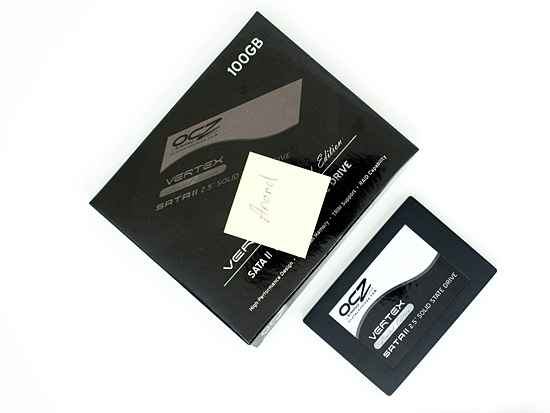
Despite its name, the Vertex Limited Edition is an MLC SandForce SF-1500 SSD (technically it's a SF-1200/SF-1500 hybrid like the Vertex 2 Pro, but that's a separate issue entirely). It's basically the Vertex 2 Pro with one big caveat - there are only a limited number of these drives being made - 5,000 to be exact. Once they're all gone, that's it.
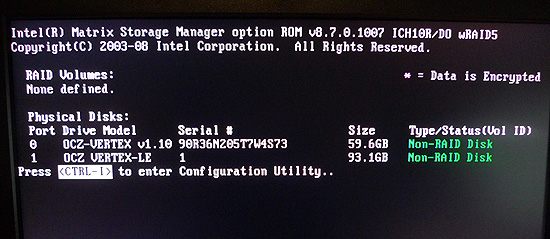
My Vertex LE is Serial #1. Ebay, here I come!
OCZ apparently got a sweetheart deal on an early batch of SF-1500s. This is the same controller from the Vertex 2 Pro in December, but with an updated firmware (RC1). These are the first drives shipping with RC1 of the SF-1500 firmware and will presumably not die on you after a couple of weeks. While I’ve heard that they may not be enterprise worthy, they are apparently fit for desktop use. OCZ has said that in its internal testing there haven't been any cases of a bricked Vertex LE. The same was not true during the Vertex 2 Pro test period. Now here comes the problem.
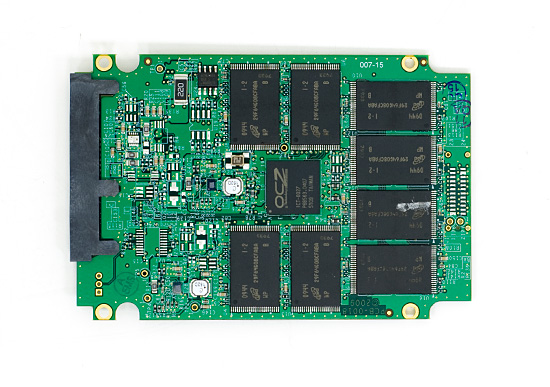
The OCZ Vertex Limited Edition. That's a SandForce SF-1500 controller under that OCZ logo in the middle.
I literally just received my drive 24 hours ago. Just like its ancestor, this thing will be put through the wringer for the coming weeks and months. However long it takes to make sure it is worthy of your dollars. The problem is that these drives are limited in quantity, chances are they will all be gone by the time I figure out whether or not they are worthy of a glowing recommendation.
What makes the Limited Edition so special is that because of OCZ’s great pricing on the SF-1500 the 100GB Vertex LE will be selling for $399 ($829 for the 200GB version) - roughly the same price as a 128GB Indilinx based Vertex drive. And in case you’re wondering, yes it performs identically to the Vertex 2 Pro I previewed last year:
| OCZ Vertex LE 100GB | OCZ Vertex 2 Pro 100GB | |
| 4KB Random Write | 51.2 MB/s | 50.9 MB/s |
| 2MB Sequential Write | 252.7 MB/s | 252.0 MB/s |
| 4KB Random Read | 52.0 MB/s | 51.3 MB/s |
| 2MB Sequential Read | 265.3 MB/s | 265.3 MB/s |
| PCMark Vantage Overall | 16827 | 16767 |
| PCMark Vantage HDD | 39288 | 39970 |
| AT Bench - Light | 884 IOPS | 890 IOPS |
| AT Bench - Heavy | 701 IOPS | 705 IOPS |
| AT Bench - Gaming | 319 IOPS | 319 IOPS |
For roughly the same price per GB you’d pay for an Intel X25-M G2, you’re getting a much faster drive. The only issue is that its reliability is unproven. To calm your fears, OCZ is selling the Vertex LE with a 3 year warranty.
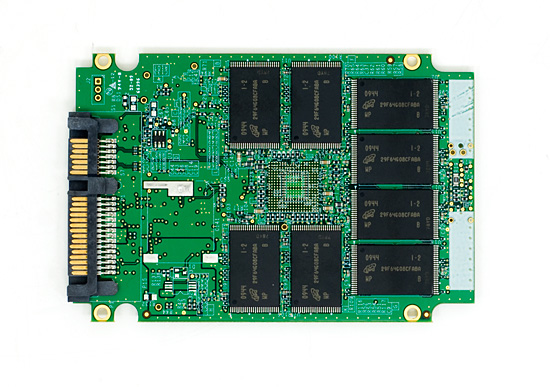
Barring any unforeseen issues, the drives will go on sale next week. Risky business.
I should note that we’ve seen vendors get quite opportunistic with hot SSDs in limited quantities before. There’s always the chance that these Vertex LEs will sell for more than their MSRP.
The nifty OCZ Toolbox I showed in my Vertex 2 Pro preview presently doesn’t work with the Vertex LE. The application looks for SandForce in the controller id, which is absent from these unbranded SF-1500 controllers that SandForce unloaded. By the time the drives ship though there should be a custom version of the OCZ Toolbox ready. TRIM is supported and works perfectly under Windows 7.
Unlike the Vertex 2 Pro sample I tested, the Vertex LE doesn’t have the ungodly expensive capacitor on its PCB. As I mentioned before, these aren’t designed to go into servers and thus the supercap won’t be missed. Performance on the drive is great and I haven’t had any issues thus far in my testing, but there’s a long road ahead of me.
The RC1 firmware is brand new to me. I’ll be putting the drive through its paces but given that the units will go on sale next week I decided to share my initial thoughts today rather than wait.










83 Comments
View All Comments
AnnonymousCoward - Sunday, February 21, 2010 - link
> Zoomer: The point of SSDs is to improve the user> response time.
Exactly! So why don't we compare response times?
> erple2: Saying that one drive attains 600 IOPS on
> "Anand's light StorageBench" where another
> attains 500 IOPS _ON THE SAME BENCHMARK_ does, in
> fact, give you a reasonably accurate comparison.
Sorry, not true. Like I said, SandForce's compression makes IOPS not equal to bandwidth. See http://tinyurl.com/yden7kc">http://tinyurl.com/yden7kc . And allow me to restate my comments from the last article: In article http://tinyurl.com/yamfwmg">http://tinyurl.com/yamfwmg , in IOPS, RAID0 was 20-38% faster! Then the loading *time* comparison had RAID0 giving equal and slightly worse performance! Anand concluded, "Bottom line: RAID-0 arrays will win you just about any benchmark, but they'll deliver virtually nothing more than that for real world desktop performance."
So there you have it. Why measure IOPS?
> erple2: what is important is the general ranking
> of these devices in the same benchmark. The
> benchmark is measuring the _relative_ performance
> of each of the drives in the same sequence of
> tests.
What "general ranking" lacks is the issue of significance. I apologize, but I will again restate what I posted on the last article: is the performance difference between drives significant or insignificant? Does the SandForce cost twice as much as the others and launch applications just 0.2s faster? Let's say I currently don't own an SSD: I would sure like to know that an HDD takes 15s at some task, whereas the Vertex takes 7.1s, the Intel takes 7.0s, and the SF takes 6.9! Then my purchase decision would be entirely based on price! The current benchmarks leave me in the dark regarding this.
jimhsu - Saturday, February 20, 2010 - link
The performance/free space dropoff is a significant issues, especially with otherwise-fast SSDs (i.e. Intel). For example, the 80GB X25-M should really be relabeled as a 60GB drive due to progressive worsening performance as the amount of free space decreases (beyond 70GB, it starts getting REALLY bad). Do these drives show any improvement in the performance to free space degradation curve?Demon-Xanth - Saturday, February 20, 2010 - link
Given the state of so many SSDs out there using so many controllers with the performance being so dependent on the controllers......if is possible to get "summary" chart of what drives use what controller configurations?
yottabit - Saturday, February 20, 2010 - link
Thought I would point out that Page 8's title lists "Apricon" instead of "Apricorn"As always, thanks for great articles Anand!
aarste - Saturday, February 20, 2010 - link
I'm building a new PC soon and was going to buy another Agility 60 and use it with my existing 60gb agility and raid0 them up. But since the Intel X25-M 80GB is almost the same price, and blows away the agility in random reads (which is more relevant in OS/App usage than sequential speed, correct?) would it be better just to buy and run the single Intel drive instead?I'm not too fussed about losing out on 120gb of capacity in raid0, and besides, I can install the games to the Agility instead, and use the Intel for the OS/Apps.
leexgx - Saturday, February 20, 2010 - link
No TRIM support in RAID so the drives would end up like 1 or less SSD speeds, SSDs really tank in speed once the drive has to erase before Write (Filled State)need to use Standard AHCI drivers (install win7 but do not install chipset drivers or Intel matrix drivers as that would disable TRIM)
1 intel SSD 80gb and the Agility 60GB with updated Firmware one you got now is the best option
(correct about random reads and Writes the intel one hardly drops in speed at random Writes at all, most get to Focused on sequential speeds, as long as TRIM support is there)
cjcoats - Saturday, February 20, 2010 - link
The one thing missing is the one that's really relevant to me: workstation performance.It's probably close to the "heavy load" scenario", but... For me, it's a mix of compiles, compute-intensive modeling, visualization, and GIS use. Of these, the compiles, the visualization, and the GIS are the really-interactive items, so are probably most important.
There are lots of compile-benchmarks out there; it would be relatively easy to generate a GIS benchmark, using some of the GRASS GIS logs I have from what I've been doing lately.
FWIW.
NeBlackCat - Tuesday, February 23, 2010 - link
I completely agree that there should be a developers benchmark, and keep mentioning this when these articles appear.Compiling a large software project seems to me to be a good general purpose test. There'll be random and sequential reads and writes, of a few bytes to many megabytes, in some hard to predict ratio, as the build process reads sources/headers, uses temporary files and writes output. It isn't obvious to me whether the Intel or the Indilinx/Micron characteristics would be favored.
But afaik no-one's studied this from an SSD angle, and I wish Anand would at least add a benchmark which could, say, build a Linux distro while grepping it repeatedly for some random text.
What say you Anand?
OfficeITGeek - Saturday, February 20, 2010 - link
Anand,As always another great article. I just wanted to say that it is looking really bright for SSD's. The performance benefits of SSD's are just to great to ignore (unlike the switch from DDR2 to DDR3). But I am going to hold off though until Q4 as by then, the market will have alot more competition (hence lower prices), bugs will be sorted out and the thought of dead drives (such as the one you experienced) just gives me the creeps even if they do replace it with a new one.
MadMan007 - Saturday, February 20, 2010 - link
Anand, it is getting hard to keep track of different SSDs, which controller they use, how many flash chips, etc. It would be wonderful if you could start an 'SSD decoder ring' chart that lists the relevant information, maybe even linked to performance numbers like you've done with CPUs.